Challenges and Opportunities in US–Russian Relations
Celeste Wallander, Deputy Assistant Secretary of Defense
Photos
 Washington, DC—On April 4, 2012, WFPG hosted a program with Celeste Wallander, Deputy Assistant Secretary of Defense for Russia, Ukraine and Eurasia policy, who joined WFPG for a discussion on the challenges and opportunities for US–Russian relations following the recent strategic "reset." The conversation was moderated by CNN Foreign Affairs Correspondent Jill Dougherty.
Washington, DC—On April 4, 2012, WFPG hosted a program with Celeste Wallander, Deputy Assistant Secretary of Defense for Russia, Ukraine and Eurasia policy, who joined WFPG for a discussion on the challenges and opportunities for US–Russian relations following the recent strategic "reset." The conversation was moderated by CNN Foreign Affairs Correspondent Jill Dougherty.
According to Wallander, US–Russian relations remain strong despite the reset. The goal of US strategy, most importantly, is to collaborate on issues "where we can collaborate" with Russia and to communicate "clearly and honestly" on issues where the two countries do not see eye to eye. Wallander argued that the US–Russian Defense working group and the NATO–Russian Council have both allowed successful, regular meetings between US, Russian, and NATO experts on a variety of issues including counter-narcotics, counter-piracy, and terrorism. In addition, the New START treaty represents an important feat in reducing global nuclear weapons stockpiles and in re-establishing mutual discussion and inspections with our Russian counterparts.
Wallander also addressed US–Russian policies towards Syria and Iran, arguing that while the two countries have largely agreed on policy towards Iran, Syria remains a topic of disagreement. She noted the crucial decision by Russia to cancel its sales of S-300 air defense systems to Iran as a positive step. However, she contended that the US and Russia continue to have vastly different views regarding intervention in Syria—though she did acknowledge that both countries agree on the need to end the violence. Wallander highlighted the recent agreements between Presidents Medvedev and Obama in Seoul to support Kofi Annan's mission to Syria.
Other challenges that Wallander discussed include Russian occupation of Georgian territory in South Ossetia and Abkhazia as well as Russia's rejection of the US–European missile defense plan. Though US leaders are aware of Russian policies towards the disputed areas, Wallander said that they do not accept them. On European missile defense, Russia up until now has refused to participate in planning the steady build-up of sea- and land-based systems designed to protect European nations and US troops in Europe from the growing threat of missile attack from the Middle East.
In response to a question on Russia's civil demonstrations, Wallander reiterated that US strategy is foremost concerned with a "prosperous, secure, militarily modern Russia" and that she is hopeful these demonstrations will provide proof of that. The turmoil over the return of President Putin to power should not overshadow the importance of the core of the country, the Russian people.
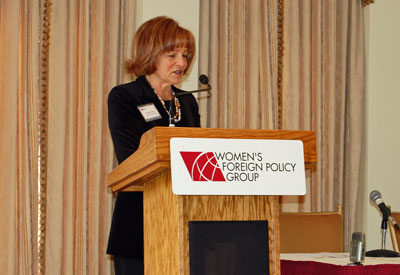 |
 |
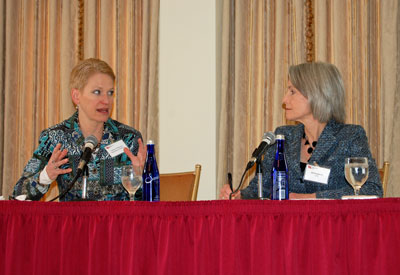 |
WFPG Board Chair Maxine Issacs opens the conversation
|
|
Celeste Wallander, Deputy Assistant Secretary of Defense,
and Jill Dougherty, CNN Foreign Affairs Correspondent
|
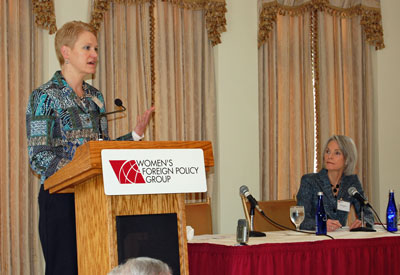 |
 |
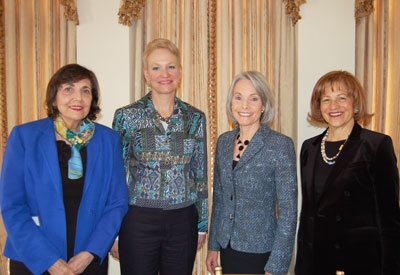 |
Assistant Secretary Wallander addresses WFPG
|
|
WFPG President Patricia Ellis, Celeste Wallander,
Jill Dougherty, and Maxine Isaacs
|
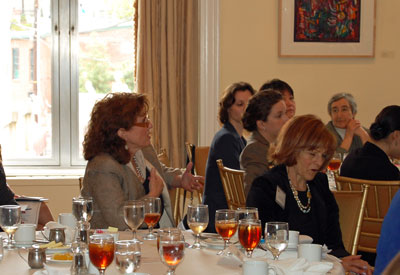 |
 |
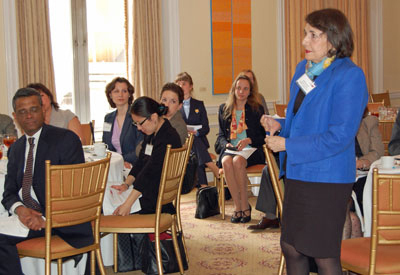 |
WFPG Board Member Donna Constantinople during Q&A
|
|
Patricia Ellis asks a question
|
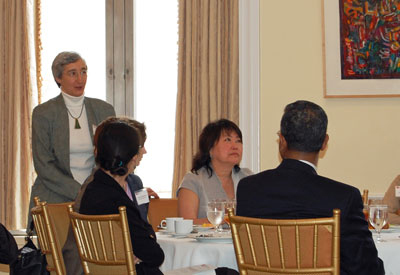 |
 |
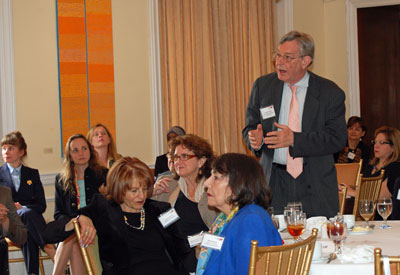 |
| |